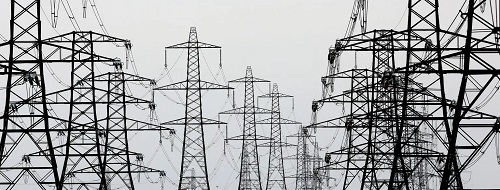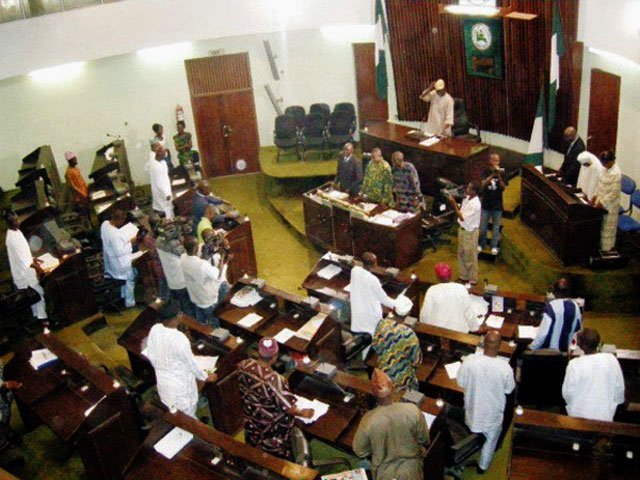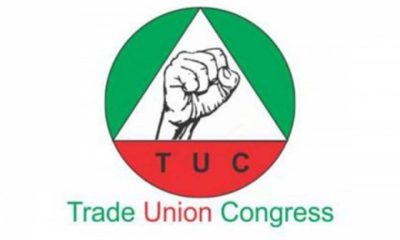BUSINESS
NIMASA Seeks More Judicial Collaboration as Nigeria Exits IMO Piracy List

From Anthony Nwachukwu, Lagos
Satisfied with Nigeria’s efforts at curtailing piracy and maritime criminalities, and its progress in the quest for security in the Gulf of Guinea, the International Maritime Bureau (IMB) has removed the country from its list of piracy hotspots, the Director-General, Nigerian Maritime Administration and Safety Agency (NIMASA), Dr.
Bashir Jamoh, has said.Jamoh, who disclosed that this happened earlier this month, commended the judiciary for their role in achieving the feat and called for more collaboration from them and other stakeholders to enable the country improve its recent successes in maritime security infrastructure, as well as the legal background against piracy and other maritime crimes.
In his welcome address to eminent jurists and distinguished experts at the 2nd Nigerian Admiralty Law Colloquium in Lagos, Jamoh stated that for the agency to keep sailing, both with and against the winds till it gets to its desired destination of maritime security, safety and shipping development, “the cooperation and support of the judiciary is crucial. Speaking on the theme of the colloquium, “Maritime Safety, Security and Shipping Development: Reflections and the Way Forward,” he said “it is imperative that all hands are on deck to ensure the success of Tripod “S” as its benefits to the nation cannot be overstated.”
He added that to maximise the nation’s maritime resources to facilitate development, the bills on NIMASA Act and other laws that also govern the “Tripod S” such as Merchant Shipping Act and Cabotage Act have been amended and were presently before the National Assembly in line with current realities and international best practices. “The theme of this year’s colloquium requires collaboration, cooperation, coordination and communication. It calls for general participation, for in togetherness we can gain efficiency, rationalise, join forces and create economies of scale that will make Nigeria more visible, credible and resourceful.
“Hence, we can safeguard our interests and value cooperatively with our international partners to make Nigerian maritime space attractive to foreign investors. This forum presents another opportunity for reviewing the steps so far taken with a view to achieving a more comprehensive policy for adjudicating admiralty conflicts.”
He commended the judiciary for the recorded convictions of criminals and their sentencing since 2021, which he said has sent a clear message to all would-be practitioners of piracy and sea criminality that Nigerian waters will never again be a safe haven for them, for “they now know that if they do the crime they will serve the time.”
These victories in the courts have rippled across the waters to help reduce piracy to a 27-year low. Additionally, Nigeria has become the judicial benchmark for the entire Gulf of Guinea in admiralty matters as other member-countries are now using the SPOMO Act as their model. Meanwhile, the Nigerian Institute of Advanced Legal Studies (NIALS) noted that the choice of this year’s theme “was necessitated by the obvious fact that in February 2020 we x-rayed the first stand-alone anti-sea piracy and maritime crimes law in the entire Gulf of Guinea (Nigeria’s 2019 Suppression of Piracy and Other Maritime Offenses Act – SPOMO Act).”
NIALS Director-General, Prof. Muhammed Ladan, stated: “We identified the loopholes in the infant law and concluded that despite its teething problems, it remained a vital tool for accelerating and achieving safe and secure shipping in Nigeria.“In April 2021, the maiden colloquium explored the critical role of the judiciary and law enforcement agencies in achieving NIMASA’s Tripod-S initiative (Maritime Safety, Security and Shipping Development) within its Deep Blue project in Nigeria and the Gulf of Guinea, and concluded that, unless member-states step up prosecution efforts and bring suspected pirates to justice, the region will remain the world’s piracy hotspot.”
Citing the IMB’s report on continuous reduction in reported cases, Ladan stated that compared to 2020, 2021 was much better for both Nigeria and the Gulf of Guinea as well as the global maritime community in dealing with piracy and other maritime crimes, with the numbers dropping to seven attacks and 20 kidnapping in Q4 of 2021- the lowest.
He noted: “The region recorded 34 incidents of maritime piracy and armed robbery at sea in 2021, a sharp drop from 81 in 2020, and while kidnappings at sea dropped by 55 per cent in 2021, the region continues to account for all kidnapping incidents globally, with 57 crew taken in seven separate incidents. “The decline of piracy incidents in the Gulf of Guinea also led to the overall global reduction in reported incidents in 2021, with 132 incidents of piracy and armed robbery against ships across the globe, the lowest recorded level since 1994. “However, the Gulf of Guinea which remains the world’s privacy hotspot, is home to Nigeria, whose economy generates over 70 per cent of the seaborne trade in West Africa and Gulf of Guinea because about 90 per cent of global trade is carried out by the international shipping industry for import/export of goods.”
Going forward, “through this strategic colloquium, we wish to enhance the capacity of, and remind our justice sector actors that we will all prosper when the seas around us are safe, secure and free for all to use and exploit natural resources, promote trade and investment, tourism, marine science and technology, maritime transport and infrastructure development to sustain fisheries and protection of the marine environment. “Through this colloquium we hope to build greater understanding of the common challenges of maritime safety and security and how SPOMO Act 2019 seeks to promote synergy among the justice sector.”
BUSINESS
Power Outage Killing Our Businesses, Enugu Residents Cry Out

Residents of Ologo, Coal Camp and Uwani areas of Enugu metropolis have decried persistent power outage in the area spanning over one week, and appealed to relevant authorities to come to their aid.
A cross section of the residents, who spoke in Enugu on Tuesday called for Gov.
Peter Mbah’s intervention to restore power supply to the area.They said that lack of power supply was affecting their businesses, households and means of livelihood.
Recall that the MainPower Electricity Distribution Company Limited (MPECL) on Aug. 4, issued a statement blaming the Enugu Electricity Distribution Company (EEDC), for the development.
According to the company, the reduction followed the decision by the Enugu Electricity Regulatory Commission (EERC) to slash electricity tariff for Band A from N209 per kWh to N160 per kWh.
Since the directive came into effect on Aug. 1, electricity consumers on Band B to E have been thrown into darkness in parts of the city, crippling many economic activities.
A welder at the Mechanic Shop in Coal Camp, Obum Chijioke, said that he had spent a lot of money on fuel to do his job adding that he went home empty handed.
According to him, it has not been easy for us in the past one week as we spend the little we make on fuel.
Chijioke appealed to the relevant authorities to look into the problem urgently and restore the energy.
A cleric in a church on Zik Avenue, who spoke anonymously, said that the church had been using diesel for its activities including services and it was taking a toll on them.
“We spend between N25,000 and N30,000 on diesel daily for our activities and it is not easy at all,”.
A retail shop operator, Chika Alejim, decried the situation, saying that it had affected her business.
She said she had not been able to chill her drinks and sachet water, which were the mainstay of her business.
According to her, the business was no longer booming unlike before, thereby, affecting her profits and incurring more expenses.
“I buy fuel of N20, 000 daily; I spend N10, 000 on fuel in the morning and another N10,000 at night and all these expenses eat deep into my profits.
“Also, the ice fish and meat, which I sell to support the provision store, got spoiled due to power outage,” she said.
In the same vein, Charles Ako, a business centre operator said that he no longer cope with the huge cost of keeping the centre functional.
“I have stopped those undergoing computer training due to absence of power supply.
“I use little fuel. I have to do photocopy and printing when a customer comes.
“I don’t know when the power issue will be sorted out; I am appealing to those concerned to help Enugu people because we are suffering,” he said.
Also speaking, a housewife, Ukamaka Ugwu described the effect of lack of power supply as serious, saying that it had pushed up the family’s daily expenses.
She said she had stopped cooking in large quantities because there was no electricity to preserve the food.
Meanwhile EERC, in a statement on Aug. 10, said steps were being taken to resolve the power shortage.
The commission revealed that it had met with both EEDC and Main Power in a bid to restore normalcy.
BUSINESS
Nigeria Requires $120bn to Build Federal Roads – TUC

The Trade Union Congress of Nigeria has stated that the country would need an estimated $120bn to construct its federal road network, a sum that is roughly four times the size of its annual budget.
The union described the gap between Nigeria’s infrastructure needs and available resources as alarming, accusing much of the political leadership of lacking the vision and innovation required to revive the economy.
Speaking at the second edition of the TUC South-West Summit 2025 in Lagos, TUC President-General Festus Osifo cited a 2013 study that put the cost of constructing all federal roads at $120bn.
He noted that Nigeria’s current budget, which stands between $30bn and $35bn, is already heavily committed to salaries, education, healthcare, defence, and other essential services.
“If constructing all our roads will cost $120bn, and the size of our budget is $30bn, it means we need four times our budget just to fix roads, without paying salaries, funding education, or providing healthcare,” Osifo told delegates. “This is why we must grow our revenue base and stop pretending that oil alone can sustain this country.”
He criticised successive governments for failing to diversify the economy in any meaningful way despite Nigeria’s vast opportunities in agriculture and solid minerals. According to him, the chronic underfunding of infrastructure is not only due to low revenue generation but also stems from weak political leadership.
“Most of our political heads, from governors to local government chairmen, are relatively lazy. In some rural councils, you will not see the chairman until allocations arrive,” Osifo said. “We cannot continue with leaders who wait for monthly allocations before doing anything. They must think beyond the obvious and work for the people.”
He contrasted Nigeria’s performance with that of countries with smaller landmasses and fewer natural resources, which earn more from agriculture than Nigeria currently generates from oil exports. “We have arable land, we have human capital, yet we leave them idle while relying on a single commodity that the world is steadily moving away from,” he added.
Representing Lagos State Governor Babajide Sanwo-Olu, Commissioner for Establishments and Training Afolabi Ayantayo acknowledged the validity of the TUC President’s concerns. He called for stronger partnerships between government and organised labour, noting that Nigeria’s diplomatic missions abroad were underutilised and often failed to secure export markets for local produce and manufactured goods.
“Collaboration is key. We must invest in skills development, fair wages, and policies that address inflation and the rising cost of living,” Mr Ayantayo said. “In Lagos, we are committed to workers’ welfare and timely salary payments, but we also recognise the need to push productivity and innovation.”
The summit, themed Collaborate to Transform: Building Capacity for Regional Excellence and Workers’ Welfare, gathered labour leaders, government representatives, and private sector experts to discuss strategies for driving economic growth in the South-West. Panel sessions explored topics such as agriculture, leadership, communication, emotional intelligence, and the role of artificial intelligence in the workplace.
In his closing remarks, Osifo reiterated that unless Nigeria’s leaders adopt more proactive and resourceful approaches, the country will remain trapped in a cycle of inadequate budgets, deteriorating infrastructure, and wasted opportunities.
“The $120bn needed to fix our roads is not just a number but a reflection of how far behind we are. Only bold and innovative leadership can bridge that gap,” he concluded.
| ReplyReply allForwardAdd reaction |
BUSINESS
Nigeria Customs Set to Review License Rates of Agents

By Tony Obiechina Abuja
The Nigeria Customs Service (NCS) said it has commenced consultations with stakeholders on planned review of licensing renewal fees for Licensed Customs Agents.
This was disclosed during a high-level stakeholders’ engagement with executives of the Association of Nigerian Licensed Customs Agents (ANLCA), the National Association of Government Approved Freight Forwarders (NAGAFF), the Africa Association of Professional Freight Forwarders and Logistics of Nigeria (APFFLON), and Customs Consultative Committee (CCC), held at the NCS Headquarters recently in Abuja.
In a statement by NCS spokesman, Abdullahi Maiwada on Sunday, the meeting marked the first in a series of consultation sessions to be held with industry players ahead of the planned implementation.
The licensing of Customs Agents remains a critical component in safeguarding the integrity of Nigeria’s cargo clearance process. The planned review is intended to reflect prevailing economic realities, including the value of exchange rates, address operational demands, and ensure that only agents who meet the Service’s compliance, competence, and integrity requirements continue to operate within the system.
The initiative is aimed at promoting accountability, streamlining processes, and enhancing the quality of service delivery in the sector.
The Service emphasised that the review forms part of broader modernisation efforts targeted at repositioning the NCS to meet the evolving needs of international trade and border management. It is expected to create a more transparent, predictable, and efficient licensing regime that will ultimately benefit legitimate operators and the trading public.
The new licensing structure is scheduled to take effect from January 2026, following the conclusion of stakeholder consultations.
Furthermore, Licensed Customs Agents who comply with the new licensing structure will enjoy access to premium facilitation measures, including faster processing timelines, improved engagement channels with Customs officers, and enhanced integration with the Service’s upgraded digital platforms.
This compliance-driven incentive is designed to encourage adherence to professional standards while discouraging sharp practices.
The NCS reassures stakeholders of its commitment to an inclusive process and notes that feedback from industry associations, individual operators, and relevant government agencies will be carefully considered before the finalisation and implementation of the review. The Service also reiterates its dedication to fairness, transparency, and the promotion of a secure, competitive, and efficient trading environment in Nigeria.































